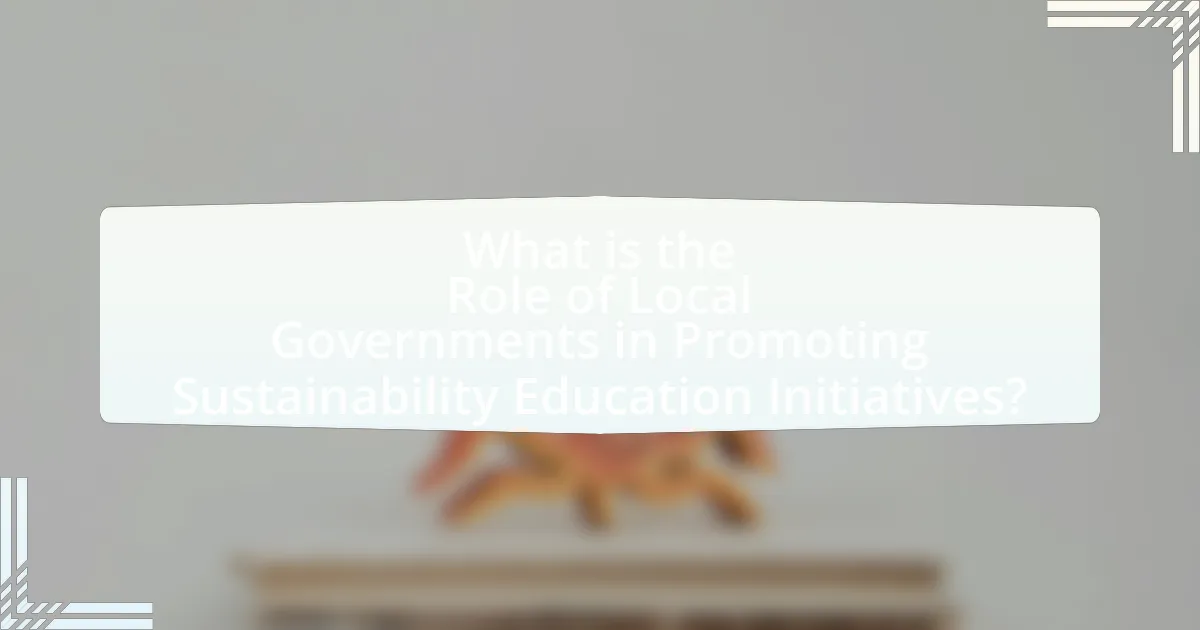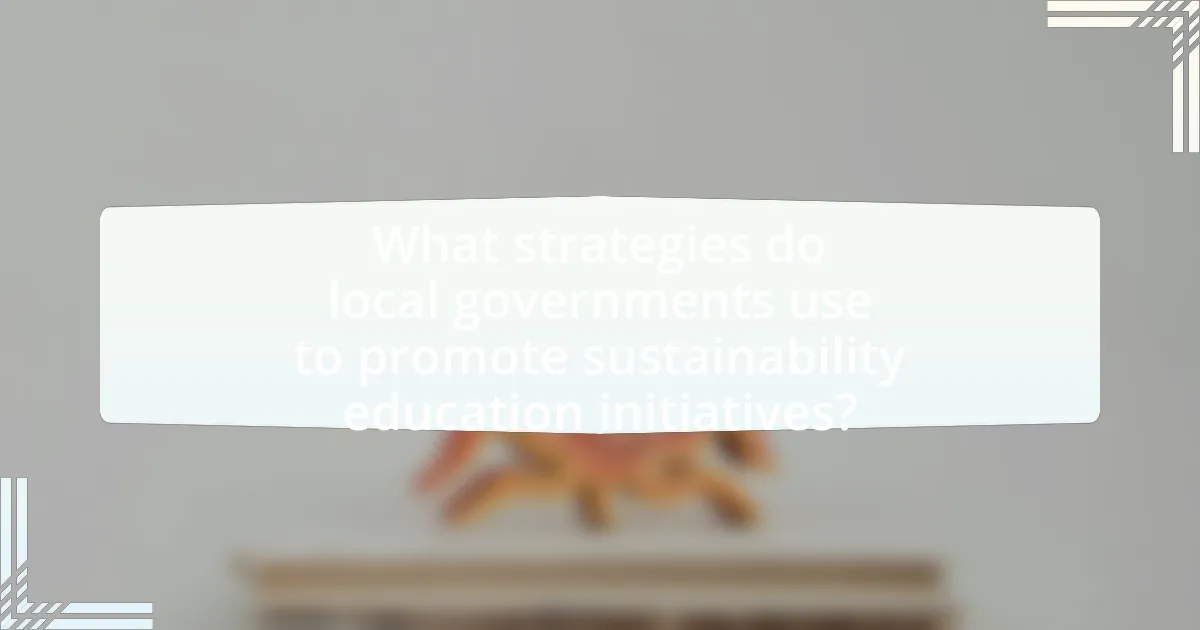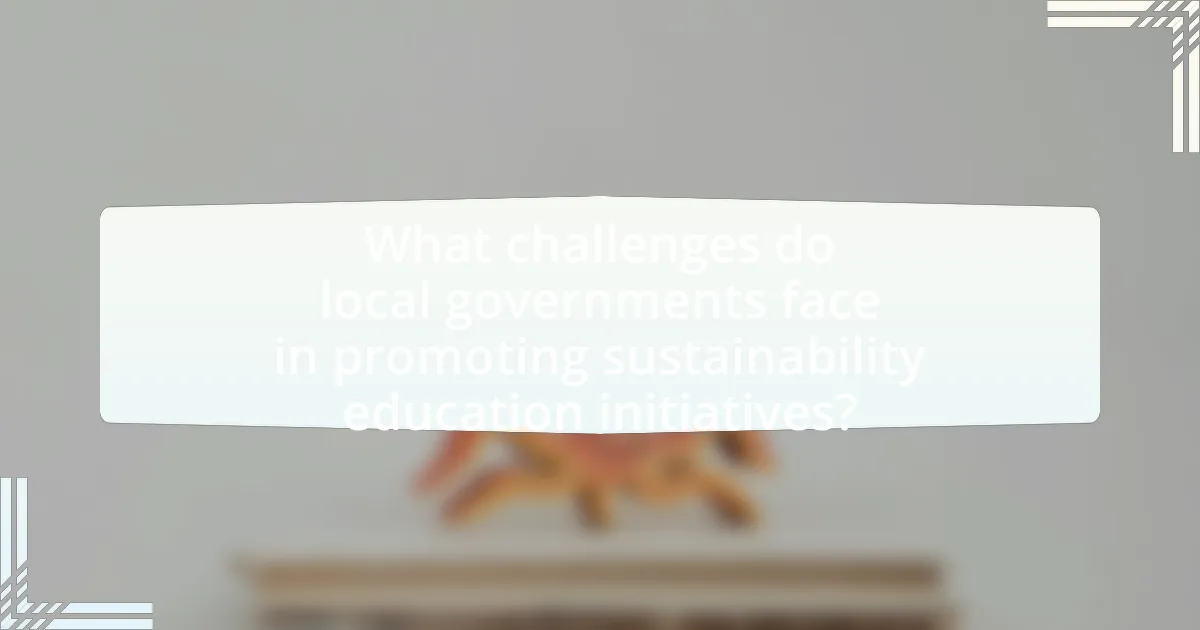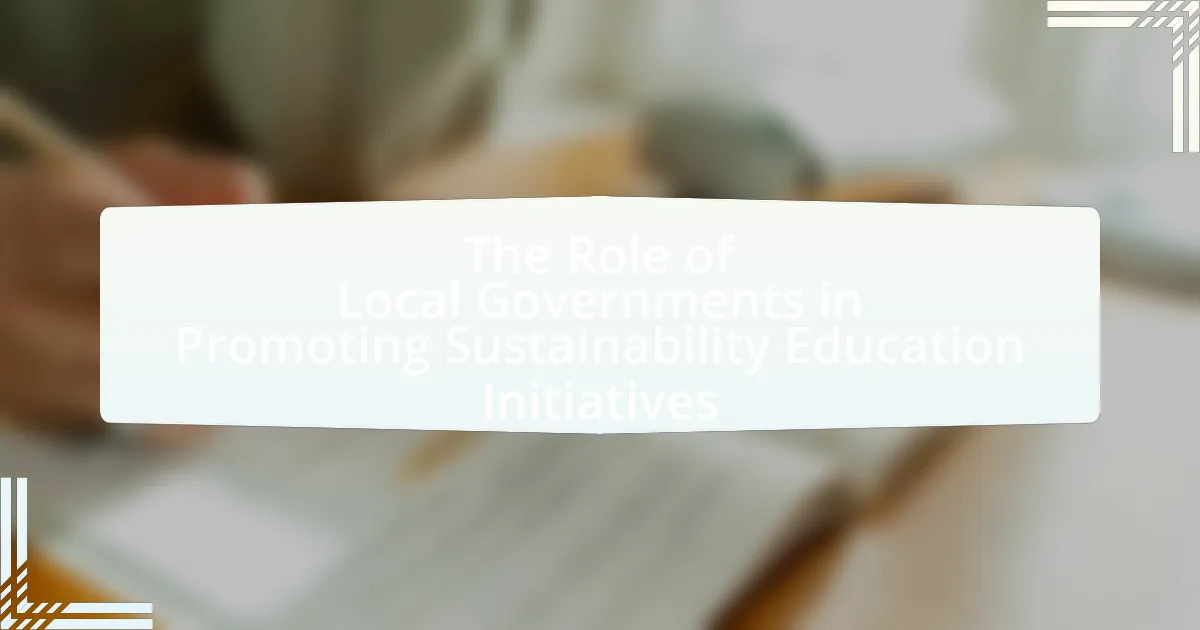Local governments are pivotal in advancing sustainability education initiatives through policy implementation, resource provision, and community engagement. They define these initiatives as programs designed to enhance awareness and understanding of sustainable practices, often incorporating workshops and educational materials. Key components include curriculum integration, experiential learning, and interdisciplinary approaches, which collectively foster critical thinking and community involvement. Local governments identify educational needs through community assessments and environmental data analysis, while partnerships with educational institutions and community organizations enhance program effectiveness. Despite challenges such as funding limitations and public awareness, successful strategies and best practices can significantly improve community participation and environmental stewardship.

What is the Role of Local Governments in Promoting Sustainability Education Initiatives?
Local governments play a crucial role in promoting sustainability education initiatives by implementing policies, providing resources, and fostering community engagement. They develop educational programs that raise awareness about environmental issues, such as climate change and resource conservation, often collaborating with schools and local organizations to integrate sustainability into curricula. For instance, the U.S. Environmental Protection Agency highlights that local governments can enhance sustainability education through initiatives like community workshops and school partnerships, which have been shown to increase public knowledge and participation in sustainability practices.
How do local governments define sustainability education initiatives?
Local governments define sustainability education initiatives as programs aimed at increasing awareness and understanding of sustainable practices among community members. These initiatives often include workshops, training sessions, and educational materials that focus on environmental stewardship, resource conservation, and sustainable development. For instance, the U.S. Environmental Protection Agency highlights that local governments implement such initiatives to foster community engagement and promote sustainable behaviors, thereby contributing to broader environmental goals.
What are the key components of sustainability education initiatives?
The key components of sustainability education initiatives include curriculum integration, community engagement, experiential learning, and interdisciplinary approaches. Curriculum integration ensures that sustainability concepts are woven into various subjects, promoting a holistic understanding of environmental issues. Community engagement involves collaboration with local organizations and stakeholders to enhance relevance and impact. Experiential learning provides hands-on opportunities for students to engage with real-world sustainability challenges, fostering critical thinking and problem-solving skills. Interdisciplinary approaches encourage connections between different fields of study, allowing for a comprehensive exploration of sustainability topics. These components collectively enhance the effectiveness of sustainability education initiatives, preparing individuals to address environmental challenges.
How do local governments identify the need for sustainability education?
Local governments identify the need for sustainability education through community assessments, stakeholder engagement, and analysis of environmental data. These assessments often involve surveys and public forums that gather input from residents about their awareness and concerns regarding sustainability issues. For instance, a study by the National League of Cities found that 70% of local governments conduct community surveys to gauge public interest in sustainability topics. Additionally, local governments analyze environmental indicators, such as waste management statistics and energy consumption patterns, to determine educational gaps. This data-driven approach ensures that sustainability education initiatives are tailored to the specific needs and priorities of the community.
Why is sustainability education important for local communities?
Sustainability education is important for local communities because it empowers individuals with the knowledge and skills necessary to make informed decisions that positively impact their environment and society. This education fosters awareness of environmental issues, promotes sustainable practices, and encourages community engagement in sustainability initiatives. Research indicates that communities with strong sustainability education programs experience increased participation in local environmental efforts, leading to improved resource management and enhanced quality of life. For example, a study by the National Environmental Education Foundation found that communities engaged in sustainability education initiatives saw a 30% increase in recycling rates and a significant reduction in energy consumption.
What impact does sustainability education have on community engagement?
Sustainability education significantly enhances community engagement by fostering awareness and participation in local environmental initiatives. This education equips individuals with knowledge about sustainable practices, leading to increased involvement in community projects such as recycling programs, conservation efforts, and local sustainability planning. Research indicates that communities with robust sustainability education programs experience higher rates of volunteerism and civic participation, as evidenced by a study conducted by the National Environmental Education Foundation, which found that 70% of participants in sustainability education programs reported increased community involvement.
How does sustainability education contribute to environmental awareness?
Sustainability education enhances environmental awareness by equipping individuals with knowledge about ecological systems and the impact of human activities on the environment. This educational approach fosters critical thinking and encourages responsible decision-making regarding resource use and conservation practices. Research indicates that students exposed to sustainability education demonstrate increased understanding of environmental issues, as evidenced by a study conducted by the National Environmental Education Foundation, which found that 90% of students reported a greater awareness of environmental challenges after participating in sustainability programs. Thus, sustainability education plays a crucial role in shaping informed citizens who are more likely to engage in environmentally responsible behaviors.

What strategies do local governments use to promote sustainability education initiatives?
Local governments employ various strategies to promote sustainability education initiatives, including community engagement programs, partnerships with educational institutions, and the integration of sustainability into school curricula. Community engagement programs often involve workshops, seminars, and public events that raise awareness about sustainability issues and practices. Partnerships with educational institutions facilitate the development of specialized programs and resources that enhance sustainability education. Additionally, integrating sustainability topics into existing school curricula ensures that students receive consistent education on environmental stewardship, as evidenced by initiatives like the U.S. Department of Education’s Green Ribbon Schools program, which recognizes schools for their efforts in sustainability education.
How do local governments collaborate with educational institutions?
Local governments collaborate with educational institutions through partnerships that enhance sustainability education initiatives. These collaborations often involve joint programs, resource sharing, and community engagement projects aimed at promoting environmental awareness and sustainable practices among students. For instance, local governments may provide funding or grants for educational programs focused on sustainability, while schools may offer facilities for community workshops or events. Additionally, local governments can integrate sustainability topics into school curricula, ensuring that students receive relevant education that aligns with community goals. This synergy not only enriches the educational experience but also fosters a culture of sustainability within the community.
What types of partnerships are formed between local governments and schools?
Local governments and schools form various types of partnerships, including collaborative programs, resource sharing, and joint initiatives focused on sustainability education. Collaborative programs often involve local governments providing funding or expertise to support educational initiatives, such as environmental science curricula or sustainability workshops. Resource sharing can include access to facilities, such as community centers or parks, for school events and educational activities. Joint initiatives may encompass projects like community gardens or recycling programs, where both entities work together to promote sustainability and environmental awareness among students and the community. These partnerships enhance educational opportunities and foster a culture of sustainability within the community.
How do these partnerships enhance sustainability education programs?
Partnerships enhance sustainability education programs by providing resources, expertise, and community engagement that strengthen educational initiatives. Local governments, when collaborating with educational institutions and non-profit organizations, can leverage funding and technical knowledge to develop comprehensive curricula focused on sustainability. For instance, partnerships can facilitate access to real-world case studies and local environmental data, which enrich the learning experience. Additionally, these collaborations often lead to community-based projects that allow students to apply their knowledge in practical settings, fostering a deeper understanding of sustainability issues. Research indicates that programs involving local government partnerships see increased participation and effectiveness, as they align educational goals with community needs and environmental priorities.
What role do community organizations play in supporting local government initiatives?
Community organizations play a crucial role in supporting local government initiatives by facilitating community engagement and providing resources for implementation. These organizations often act as intermediaries, helping to communicate government policies and programs to residents, thereby increasing public awareness and participation. For instance, community organizations can mobilize volunteers for local sustainability projects, such as tree planting or recycling programs, which align with government sustainability goals. Research shows that communities with active organizations are more likely to see successful outcomes in local initiatives, as these groups can leverage local knowledge and networks to enhance program effectiveness.
How can community organizations help in resource mobilization?
Community organizations can help in resource mobilization by leveraging local networks to gather financial, human, and material resources. These organizations often have established relationships with community members and stakeholders, enabling them to effectively identify needs and mobilize support. For instance, a study by the National Council of Nonprofits indicates that community organizations can increase funding opportunities by collaborating with local businesses and government entities, thus enhancing their capacity to secure resources for sustainability education initiatives.
What examples exist of successful collaborations between local governments and community organizations?
Successful collaborations between local governments and community organizations include the partnership between the City of San Diego and the San Diego Community College District, which launched the “Sustainable City Program” to promote sustainability education. This initiative has led to the development of courses focused on environmental stewardship and green technologies, benefiting over 1,000 students annually. Another example is the collaboration between the City of Portland and local non-profits like the Oregon Environmental Council, which resulted in the “Portland Climate Action Plan.” This plan engages community members in sustainability practices, reducing carbon emissions by 30% since its implementation in 2009. These collaborations demonstrate effective strategies for enhancing sustainability education through community involvement and local government support.

What challenges do local governments face in promoting sustainability education initiatives?
Local governments face several challenges in promoting sustainability education initiatives, including limited funding, lack of public awareness, and insufficient collaboration with stakeholders. Limited funding restricts the development and implementation of comprehensive educational programs, as many local governments operate under tight budgets. Additionally, a lack of public awareness about sustainability issues can hinder community engagement and participation in educational initiatives. Furthermore, insufficient collaboration with local organizations, schools, and businesses can lead to fragmented efforts and missed opportunities for impactful partnerships. These challenges collectively impede the effectiveness of sustainability education initiatives at the local level.
How do funding limitations affect sustainability education programs?
Funding limitations significantly hinder sustainability education programs by restricting resources necessary for effective implementation. These financial constraints lead to reduced program scope, limiting the number of participants and the quality of educational materials. For instance, a study by the National Center for Education Statistics found that schools with inadequate funding often lack access to updated curricula and training for educators, which directly impacts the effectiveness of sustainability initiatives. Consequently, without sufficient funding, local governments struggle to promote comprehensive sustainability education, ultimately undermining community engagement and awareness.
What are potential solutions to overcome funding challenges?
Potential solutions to overcome funding challenges include diversifying funding sources, establishing public-private partnerships, and leveraging community resources. Diversifying funding sources allows local governments to tap into grants, donations, and sponsorships, reducing reliance on a single funding stream. Public-private partnerships can enhance resource allocation by combining government support with private sector investment, as seen in successful sustainability projects that have utilized this model. Additionally, leveraging community resources, such as volunteer efforts and local expertise, can significantly reduce costs and enhance project sustainability, evidenced by initiatives that have thrived through community engagement and support.
How can local governments prioritize sustainability education despite budget constraints?
Local governments can prioritize sustainability education despite budget constraints by leveraging partnerships with local organizations and utilizing existing resources. Collaborating with non-profits, educational institutions, and community groups allows for shared funding and expertise, reducing the financial burden on local governments. For instance, programs like the U.S. Environmental Protection Agency’s Environmental Education Grants provide funding opportunities that local governments can tap into to enhance their sustainability education initiatives. Additionally, integrating sustainability topics into existing curricula and community programs can maximize impact without requiring significant new expenditures. This approach not only fosters community engagement but also ensures that sustainability education remains a priority even in financially challenging times.
What barriers exist in community participation in sustainability education?
Barriers to community participation in sustainability education include lack of awareness, limited access to resources, and insufficient engagement from local governments. Many community members are unaware of sustainability issues and educational opportunities, which hinders their involvement. Additionally, inadequate access to educational materials and programs can prevent participation, particularly in underserved areas. Furthermore, local governments often fail to actively engage communities in sustainability initiatives, leading to a disconnect between governmental efforts and community needs. These factors collectively impede effective community participation in sustainability education.
How can local governments address misconceptions about sustainability education?
Local governments can address misconceptions about sustainability education by implementing targeted outreach programs that provide clear, factual information. These programs can include workshops, community forums, and educational materials that clarify what sustainability entails and dispel common myths. For instance, a study by the National League of Cities found that municipalities that actively engage residents through educational initiatives see a 30% increase in public understanding of sustainability concepts. By fostering open dialogue and providing accessible resources, local governments can effectively reshape public perceptions and enhance community involvement in sustainability efforts.
What strategies can be implemented to increase community involvement?
To increase community involvement, local governments can implement strategies such as organizing community workshops and events focused on sustainability education. These initiatives foster engagement by providing residents with hands-on learning experiences and opportunities to collaborate on local sustainability projects. Research indicates that community-based participatory approaches, such as those outlined in the “Community Engagement for Sustainability” report by the National League of Cities, enhance public participation and lead to more effective sustainability outcomes. By actively involving community members in decision-making processes, local governments can build trust and encourage ongoing participation in sustainability initiatives.
What best practices can local governments adopt for effective sustainability education initiatives?
Local governments can adopt best practices such as integrating sustainability into school curricula, promoting community workshops, and collaborating with local organizations for effective sustainability education initiatives. Integrating sustainability into school curricula ensures that students receive foundational knowledge about environmental issues, which is supported by studies showing that early education leads to long-term behavioral changes regarding sustainability. Promoting community workshops allows local governments to engage residents directly, fostering a culture of sustainability through hands-on learning experiences. Collaboration with local organizations can enhance resource sharing and expertise, as evidenced by successful partnerships that have increased community participation in sustainability programs.
How can local governments measure the success of their sustainability education programs?
Local governments can measure the success of their sustainability education programs through quantitative metrics such as participant engagement, knowledge retention, and behavioral changes. For instance, surveys can assess pre- and post-program knowledge levels, while tracking participation rates can indicate community interest and engagement. Additionally, analyzing changes in local environmental behaviors, such as increased recycling rates or reduced energy consumption, provides concrete evidence of program impact. Research conducted by the National Environmental Education Foundation highlights that effective evaluation methods, including participant feedback and long-term impact assessments, are crucial for understanding program effectiveness and guiding future initiatives.
What innovative approaches have proven effective in engaging communities?
Innovative approaches that have proven effective in engaging communities include participatory budgeting, community-led workshops, and digital storytelling initiatives. Participatory budgeting allows residents to directly influence how public funds are allocated, fostering a sense of ownership and responsibility. Community-led workshops, often facilitated by local governments, empower residents to share their knowledge and skills, enhancing collaboration and trust. Digital storytelling initiatives leverage technology to enable community members to share their experiences and perspectives, creating a shared narrative that strengthens community bonds. These methods have been supported by studies showing increased civic participation and improved community cohesion, such as the 2018 report by the National League of Cities, which highlights the positive impact of participatory budgeting on community engagement.

Leave a Reply